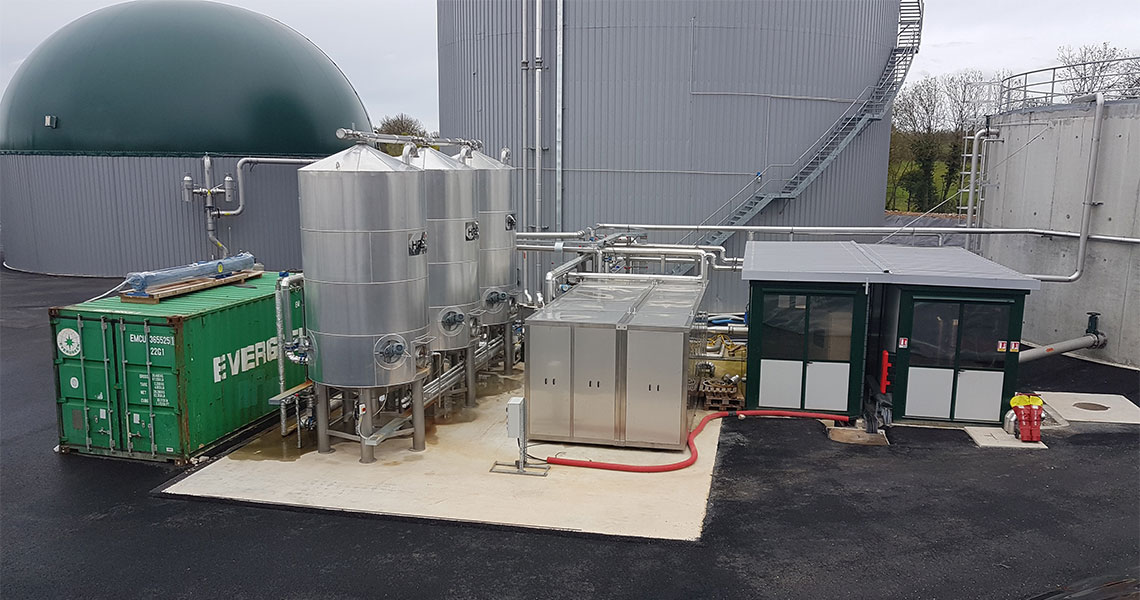HRS helps French AD plant turn waste into resource

HRS Heat Exchangers is supplying the pasteurisation technology for a new anaerobic digestion (AD) plant in the south of France, which, once operational, will convert more than 65,000 tonnes of abattoir and agricultural waste products into electricity, useful heat and a valuable biological fertiliser for use by local farmers.
The plant is being developed for a leading French renewable energy company by Italian-based Sebigas. The biogas plant will process a wide range of feedstock including manure from cattle and ducks, together with food waste, fats, blood and other abattoir wastes. Once operational it will have the capacity to generate 1.8 MW of electricity, heat for use in the abattoir for heating and cleaning, and pasteurised, nutrient-rich digestate fertiliser. Construction of the plant is expected to be completed in November this year.
One of the key benefits of anaerobic digestion is that the resulting digestate is high in nutrients and makes an excellent biological fertiliser for use in agriculture. Digestate provides readily available nitrogen, as well as other key crop nutrients such as phosphorus and potassium, however, due to the nature of some of the feedstocks which will be used, it is important that any pathogens are treated to prevent contamination of land or crops and to comply with regulations on animal by-products.
Some form of pasteurisation system was therefore required, so Sebigas contacted HRS Heat Exchangers, who recommended the use of an HRS Digestate Pasteurisation System (DPS). After a competitive tendering process, Sebigas chose the HRS solution – which has been used successfully in a number of UK AD plants that treat animal by-products – due to its high efficiency, the fact it is designed specifically for use in AD plants, and its ability to regenerate heat for use in the AD plant and the abattoir.
Before digestion, the feedstock is pasteurised in the DPS by holding it at 70 oC for an hour, in order to kill any pathogens present. The DPS has the capacity to treat 11 m3/hr of feedstock and consists of three digestate holding tanks, together with the necessary heat exchangers, pipework, valves and instrumentation. By using three tanks, one tank can be pasteurising the feedstock while one is being emptied and another filled, enabling a continuous flow of material into the digester. The unit can also operate with two tanks, meaning that throughput can be maintained while the unit is being serviced or cleaned.
The DPS design includes a heat recovery section which helps to reduce the energy consumption needed for pasteurisation, as well as capturing surplus energy and using it to maintain AD reactor temperature via another heat exchanger specifically for this purpose. Any additional surplus heat will be used in the abattoir complex, for example for heating livestock housing or cleaning water.
Under French legislation the plant will attract a feed-in tariff for the electrical energy generated using a combined heat and power (CHP) engine from the biogas produced. An additional tariff can be claimed for the use of additional heat outside of the AD plant itself and a bonus is paid for efficiency.
Arianna Perghem, Project Manager for Sebigas, commented:
“This is our first biogas plant in France. After looking at the various options for pasteurisation we chose the HRS DPS because of its strong reputation and the reliability of the technology being used. Another important consideration was the ability of the system to regenerate heat for use in the AD plant and the abattoir complex. Not only does this increase efficiency, but also improves the rate of feed-in tariff received.
This biogas plant is a virtuous example of how waste can be transformed in a primary resource for the production of clean energy.”
Arnold Kleijn, HRS Sales & Product Development Director for Europe, added:
“After Sebigas narrowed down their list of potential suppliers of pasteurisation technology we had several meetings to discuss the scope of the project and optimise the design of the DPS to suit. In March Sebigas representatives visited our manufacturing facilities to see the construction of a DPS unit and the final contract was agreed. This is the first HRS DPS we have sold to a customer outside the United Kingdom, and it further illustrates the benefits that the DPS can bring to anaerobic digestion projects around the world.”